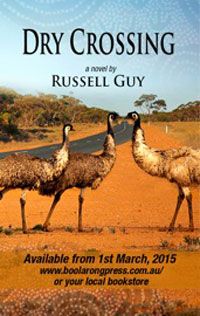Looking for love and meaning on the road
13 May 2015
Archived article
 Dry Crossing
Dry Crossing
By Russell Guy
Boolarong Press
Salisbury, Qld, 2015
Reviewed by KIERAN FINNANE
The “poetry and song of the road” is the stuff of Russell Guy’s novel Dry Crossing for its first thirteen chapters. There is a narrative thread – the travels and travails of Dizzy Roundabout – but it is secondary to the evocation of Dizzy’s intense experience of life on the road, one encounter after another, with the land in many moods, its creatures, animal and human, its cultures.
Dizzy is a whitefella musician in an Aboriginal band until he leaves them behind in chapter thirteen to take his chance in love with Nina, whom he has been seeing on and off at the NT roadhouse where she works. The story takes off when they pass each other, ‘ships in the night’, him heading hopefully for the roadhouse, her leaving it, having given up hope in him. From there Dizzy loses everything, even his guitar. He hits rock bottom in Tennant Creek and the last third of the book is often absorbing and moving as he finds his way again.
Guy (below) has a lyric talent and the read for the first two thirds is full of description, often with a revelatory quality. Readers may be disappointed, however, in the under-development of the first part of the narrative, rich in potential. The characters in the band, The Little Trees, are only sketched in. What is there feels authentic – the places they play, the way they speak and dress, their humour, foibles and reckless kind of energy – but I still didn’t feel that I had come to know them. Nina, the same.
 We are told about Dizzy, his longings and losses, from quite early in the piece, but he starts to gain more substance when we are given (in chapter five) a simple memory from his childhood – an experience of being with his father, rescuing an injured bird. His story gathers both more pace and depth when he stops moving. Dizzy, the character, has to do this, to work out who he is, what he believes in, what he wants most from life. But it seems that the author too had to halt him in his tracks, physically, in order to grab hold of him. From this point also a strong sense of place – the town and its people – emerges.
We are told about Dizzy, his longings and losses, from quite early in the piece, but he starts to gain more substance when we are given (in chapter five) a simple memory from his childhood – an experience of being with his father, rescuing an injured bird. His story gathers both more pace and depth when he stops moving. Dizzy, the character, has to do this, to work out who he is, what he believes in, what he wants most from life. But it seems that the author too had to halt him in his tracks, physically, in order to grab hold of him. From this point also a strong sense of place – the town and its people – emerges.
This is not to say that the vast swathe of Australia that Dizzy and The Little Trees cross and recross is not recognisable and alluring. I delighted in many of Guy’s vivid ‘postcards’, but then they were gone, the way it is with travel. These scenes needed to be more connected to the story being told. Dizzy is struggling with the fracturing of his life on the road, but we the readers need to be held by a narrative that is more sustained.
In Tennant Dizzy comes into contact with a Christian missionary. His interest in religion and spirituality, including the beliefs of Indigenous people, has already been foreshadowed. But now in his self-examining despair and through the friendship and support offered by the missionary, Dizzy slowly moves towards embracing faith. This kind of material is quite hard to manage in a contemporary setting, but Guy pulls it off with feeling and thinking. There are reflections on Augustine’s Confessions, on passages in The Bible, conversations with “the Mish”, with Aboriginal and other Christians, with non-believing party-goers. The solace of spiritual thought and practice for a pained, lonely, somewhat jaded yet thoughtful man is well evoked.
It comes with a disturbing undertow though in relation to women. Sexual desire and its gratification with them are cast as corrupting temptations on Dizzy’s journey. He isn’t sure that his longing for Nina amounted to more than losing himself in sex with her. He has the same reaction when Karin tries to draw him in: “unbridled passion” will reduce his soul “to ashes”. It’s all about him; there’s little acknowledgement of what these woman might want and need, nor examination of what he himself has to offer. When Karin, drunk, is saying goodbye, she regrets the fun they might have had. Dizzy too, but he turns away, “thinking of how he would’ve liked to have taken her apart” – a rather gruesome fantasy of sex, I found. Driving the point home, his next thought is about “Dante’s description of Satan spending his days pulling the wings off butterflies”.
These thoughts are not resolved in the narrative; rather they are dissolved by a marriage ceremony. We don’t see Dizzy becoming a man who can see his partner wholly.
Along with a lot of the other characters in the novel, Dizzy is also struggling with alcohol, which he seems to have renounced by the end. Guy, well known in The Centre for his campaign to raise greater awareness of the damage being done by the grog, handles this strand of the story well. There’s a rich characterisation of drinking cultures, no tub-thumping, and a good scene, well integrated with the story, of a public meeting about grog and its sale in Tennant Creek.
Dry Crossing is Russell Guy’s first novel. He has a cult radio play to his name (What’s Rangoon to you is Grafton to me, 1978) and a history of the Daintree Aboriginal Mission (1999). He is now working on a new novel as well as a play about John Flynn.



I find it difficult to accept the review’s closing argument that “it’s all about him” – the protagonist, Dizzy Roundabout in my novel Dry Crossing, when Nina, the woman referred to is introduced as having seduced him.
The promiscuity of the 60s and 70s on which Dizzy reflects had as much to do with female complicity as male.
While not attempting to distance male behaviour, the same can be said to be true today, cougars and mainstream pornography notwithstanding.
It took women like Linda Lovelace to reject these values as much as Dizzy comes to the same realisation.
The comment that he rejects Karin’s declaration of “fun” appears not to have noticed that such behaviour is revealed with tragic consequences during the earlier scenes in her relationship as a friend of Nina’s, which Dizzy, though existentially tempted, rejects for the same reasons in the scene referred to towards the end.
His subsequent reflection in what the review refers to as “gruesome” is mistakenly attributed and there is no inference to lust in the following thought about Dante’s observation which is also existential, although the two are part of his character flaws – the dark side liberated by the modern novel – and for which he assumes responsibility.
These complexities inform Dizzy’s character as a “thoughtful man” who acknowledges his exploitative past and tries to redeem it. Karin’s drunkenness in the scene referred to above is underscored as part of the corrupting sex, drugs and r’n’roll lifestyle at the heart of the novel.
The “disturbing undertow” is a feminist argument where feminism has failed and presented as part of Dizzy’s revelation, which curiously is acknowledged as insight in earlier chapters of the review.
Whilst I accept that the narrative could have been better sustained, the character of Dizzy Roundabout, though still somewhat existential in his humanity is restored by his association with the elderly Christian missionary and exemplified in his journey of faith.
In 1916, Maxim Gorky wrote: “I believe that Jewish wisdom is more all-human and universal than any other and this is not only because of its immemorial age, not only because it is the firstborn, but also because of the powerful humaneness that saturates it, because of its high estimate of man.”
This sentiment is embraced by Hector, the indigenous pastor in Dry Crossing and finds comparison in Blind Moses, the subject of Peter Latz’ recent book about the Arrernte evangelist of Hermannsburg, culminating in Dizzy’s crossing of the Barkly which leads to his hope of realising these mature values through the committed relationship of a marriage.
Such commitment is foreshadowed early in the novel’s complex, yet thoroughly contemporary themes most of which the review acknowledges and which I have attempted to explore, if not resolve, in this novel.